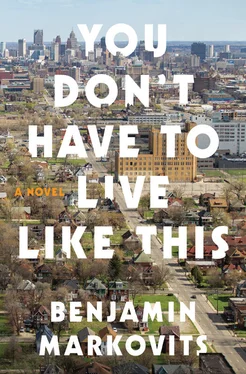“So what did he say? I mean, did he explain what he thought he was doing?”
“He said, the way we were living, it didn’t seem to him any violation of our marriage for him to get a room somewhere in New Orleans and spend a little time there.”
“What did he mean by that?”
“You know what he meant. Don’t make me say it,” she said.
It was very hard for me to tell how much I cared. I don’t mean that I didn’t seem to care at all, just the opposite. I talked about what was happening to Gloria and sometimes it felt like a kind of offering to her. She had told me her terrible story about her father and so I was telling her mine. Gloria turned out to be a good sympathizer. She had the kind of sympathy people want more of. But what I was doing using this material, which was more or less the story of my life, the people who made me, my whole childhood, and feeding it into a relationship that was about a month old, like it was some kind of fuel, to raise the temperature, I don’t know.
A week after New Year her classes began, which knocked her out most evenings, but we saw each other on the weekends. She introduced me to her mother, who was an attractive, elegant, not very nice woman, in her early fifties. She had long straightened black hair, with some white in it, and a long sort of French-looking face. I guess her coloring was what people in books call high yellow. By this point I had started reading a lot of African American literature— Black Boy first, then Another Country . I figured I may as well educate myself, but I was also a little ashamed, since it seemed I had a taste for it, and I didn’t want Gloria to know it was a taste.
Her mother was named Eunice; her stage name was Eunice Ray. She used to be a singer and was moderately successful in her thirties, when Gloria’s father met her at Cliff Bell’s jazz club. It wasn’t called Cliff Bell’s then, but something else. I heard this story from Gloria first, and then Eunice. Tom Lambert seems to have been a well-known, well-liked figure in his community. People came to him with their legal problems, he listened to everybody, he worked hard. But he also liked to have a good time, even if he didn’t drink, he liked pretty women. “I was one of them,” Eunice said. “Gloria takes after her father. What?”
“Nothing,” Gloria said.
But she showed me a few photographs. Her father had one of those innocent happy dark-skinned white-teethed black faces that probably cover up a lot of private opinions. He must have been fairly old when they had Gloria. I got the sense that she was his darling girl, and maybe Eunice used to resent it, and still did.
The first time I met her she gave us brunch in her apartment. It was all laid out when we got there, on her number one china. Eunice was dressed in a thin floating dress or robe, which had an African print on it, made of different browns, but you could also see through it to her gray silk underclothing. I was incredibly nervous, but Gloria told me not to worry. My mom’s a big snob, she said. And in fact we ended up ganging up on Gloria, making fun of her.
Afterwards I saw her around the building occasionally. She always looked heavily made-up, even when stepping out with the trash. I offered to carry it down for her once — she seemed the kind of woman who doesn’t mind a little gallantry.
Gloria and I talked about our parents a lot. At the end of January a letter from my father arrived. He had called a few times while I was out, but I hadn’t called back. This is what he said in his letter, or the gist of it anyway. He said he hadn’t been happy since he retired. There are men who like retirement but not that many in his experience. He used to argue with my mother about moving back to New Orleans, but the truth is, she never liked the city very much, and her life was the house. But he didn’t have anything to do.
“This is why I watched all that TV,” he wrote. “Even when you were kids I watched a lot of TV. Instead of getting up to no good. I thought, better stay on your ass and watch TV. Keep out of trouble. And I don’t regret the time I spent on the couch, because I wanted to be a good husband and father. And believe me, the TV helped. But I’ve been playing that game now for almost forty years, and after a while I thought, who are you doing it for anymore. You kids don’t need us anymore. And I don’t make your mother particularly happy. You’re sixty-five years old, and all your so-called domestic virtue is really just another name for laziness. So get off your ass. I don’t have any illusions about going it alone either. Men of my generation weren’t brought up to it. But I’ve got a room at the Wenzlers’, and there isn’t a TV in it. If I haven’t got a reason for going out I lie in bed and read books. When I was your age, or maybe a little younger, I loved to read. Of course, there’s another side to my life here but I don’t expect you want to hear about it so I won’t tell you. But this is what I want to say. From the outside I look like a worse man now than I did two months ago. But it doesn’t feel that way from the inside, it really doesn’t. For the first time in years I feel like a moral agent again. I’m a human being, and people coming into contact with me are bumping into somebody who is actually there. They get some response. For years, and this is literally true, I didn’t say a single thing I hadn’t said before, not to anybody, not even to your mother. Now I say something new every day. All this is kind of a long-winded apology. But what I really want to apologize for is that dumb fight we had over Christmas, when I was still dealing with this shit. Maybe I was jealous of you. Your brother understands a little better what I’m talking about, he has three kids of his own. But he’s also got his own reasons for staying mad, which you don’t have. So next time I call you pick up the phone, don’t play these answering-machine games. They’re beneath you. And let’s talk.”
And he signed himself with his name, “Your father, Charlie.”
I showed this letter to Gloria, but for once she gave me the wrong kind of sympathy. I’m sorry, she said, this is the craziest excuse I ever heard. A man walks out on his wife to make himself a better man. And for something to talk about. You’ve got to be kidding me. She got too angry on my behalf; she was also a little angry at me. But we didn’t have a fight about it — I kept the lid down.
Walter knew my father a little, they met at graduation, but he wasn’t around to talk to. When I got back from Baton Rouge I found a note under my door. Walter and Susie had decided to fly home — they were going to spend New Year with his mother. I was surprised the doctors let her fly. And then one night Walter came back alone. I heard his taxi idling in the street and went down to say hello. Susie had stuck around in New York and was trying to mend fences with her parents. I carried one of his suitcases inside.
He offered me a cup of tea and I went upstairs to get some fresh milk. Then he told me what had happened. Just before Christmas they lost the baby. For two days Susie didn’t feel any kicking. She was getting more and more panicky, so Walter told her to go in, just so the doctors could calm her down. But the heart had stopped. There was a problem with the placenta, blood clots; the truth is, they were surprised the placenta had lasted as long as it did. Then they doped her up with Pitocin so she could push the baby out. Susie found the whole thing not only unbelievably awful but tremendously embarrassing — to go through all the special attention of labor for the sake of this dead thing. So afterwards they flew home. She needed a change of scene and couldn’t face anybody who knew her pregnant. They weren’t telling people yet so I should keep quiet. And I didn’t feel like bringing up my father with him. He looked fat and sweaty and unhappy. There wasn’t much to eat in his apartment, but he found an old box of Entenmann’s powdered doughnut holes and kept popping them into his mouth while we talked.
Читать дальше












